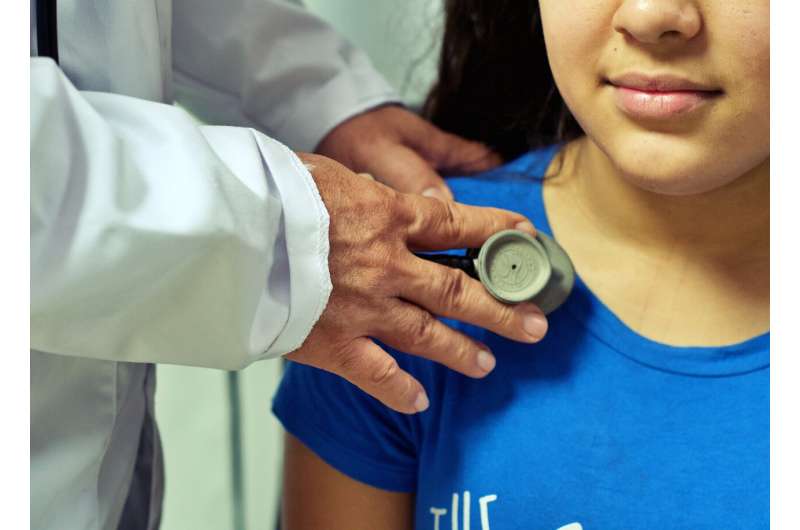This article has been reviewed according to Science X's editorial process and policies. Editors have highlighted the following attributes while ensuring the content's credibility:
fact-checked
reputable news agency
proofread
What should parents know before heading to the emergency department

Sooner or later, you will find yourself taking your child to the emergency department—it's bound to happen. Nearly 30 million children visit the ED each year in the United States.
In a serious emergency, you should always go to the closest ED. Do you know where your nearest ED is located? Do you know which hospital your pediatrician is affiliated with?
If you take your child to an urgent care center or ED that does not have pediatricians or pediatric specialists on staff, your child may need to be transferred to a hospital that does depending on his or her condition.
Children's hospitals, for example, have an atmosphere more geared to children—colorful rooms and murals, waiting room toys and TVs tuned to kids' shows, and child-sized furniture. Some children's hospitals and pediatric emergency departments also have child life specialists on staff.
They are highly trained to help families and can be an excellent resource to make your child's stay more comfortable in the ED and provide a bridge between the hospital and home. Child life specialists also help to ease your child's anxiety before, during and after procedures.
If you can reach your pediatrician's office first, do so. They can give advice on the phone and, if you do need to head to the ED your pediatrician can call ahead and tell the emergency staff to expect you. In a serious emergency, parents should not hesitate to call 911.
It is OK to give your child over-the-counter fever or pain medicines before heading to the emergency room. The medicine will make a huge difference and often makes the examination process a lot easier. Remember to take note of the time and dosage you gave your child, as it will be one of the first questions you are asked in the ED.
Stay calm and tell your child what to expect
When you panic, your child's anxiety level goes up. For many kids, the anxiety about what's going to happen is worse than the actual pain. Children of all ages look to their parents for reassurance, so it is important to keep communicating. Be honest, but also be sensitive to the situation and his or her age. Let your child know that everyone is there to help.
If possible, make arrangements so you don't have to bring young siblings to the ED with you. This way, you can focus on the needs of your sick child, and your other children do not have to endure the waiting time. Note that you will need to stay with your child throughout his or her ED stay and are strongly encouraged to stay in the hospital with your child if he or she is admitted.
It's always a good idea to have the following information readily available. You may be asked for this information by multiple providers and staff in the ED:
It is also important to know the time your child last ate. Many emergency rooms do not allow patients to have anything to eat or drink until the doctor says it is OK. The main reason is to protect your child if he needs to have a procedure done and/or receive any medications that require an empty stomach. During this time, it's a good idea to refrain from eating in front of your child.
If your child requires a special item to rest or feel at ease, don't hesitate to bring it. A lovey, toy, blanket or book can help take your child's mind off the pain and less anxious in an unfamiliar place.
Understand that there may be good reasons to wait in the emergency department. The sickest patients are seen first. The ED can be a very daunting place and frustration can easily set in.
Please be respectful toward the health care staff taking care of your children. They also have your child's best interest in mind. If your pediatrician calls the hospital before your arrival, however, it can sometimes help speed up the process. In addition, depending on how sick your child is, he or she may need blood work and/or imaging. Realize that it can take a long time for lab work and/or imaging results to come back.
As a parent, you are the best advocate for your child and the best interpreter of his or her needs. If you think your child is in pain, say so. If you don't think he or she is ready to go home, tell a member of the ED team.
Don't be afraid to ask repeated questions and be patient. You and your child will meet lots of different people—the ED is a multidisciplinary team. Repeating your story and providing background to each doctor can seem redundant, but it is essential to getting the best care for your child.
Keep in mind that you may not receive all the answers to the reasons for your child's illness during an emergency department visit. Your child may need further evaluation through an inpatient or intensive care unit admission, or an outpatient visit with a subspecialist.
After the emergency department visit, call your pediatrician's office and inform them about the diagnosis. Many EDs will also send a report to your pediatrician's office if you ask them to. Check to see whether your pediatrician has received the report or if he or she has any further recommendations. Many times, your pediatrician will ask to see your child for a follow-up exam.
2024 Tribune Content Agency, LLC.




















